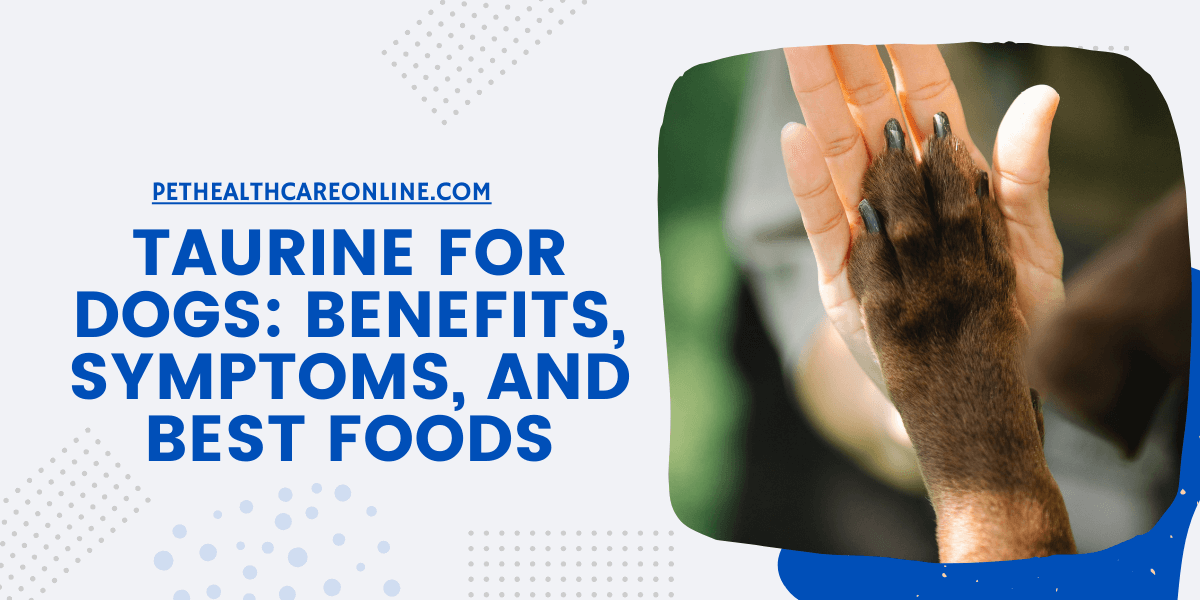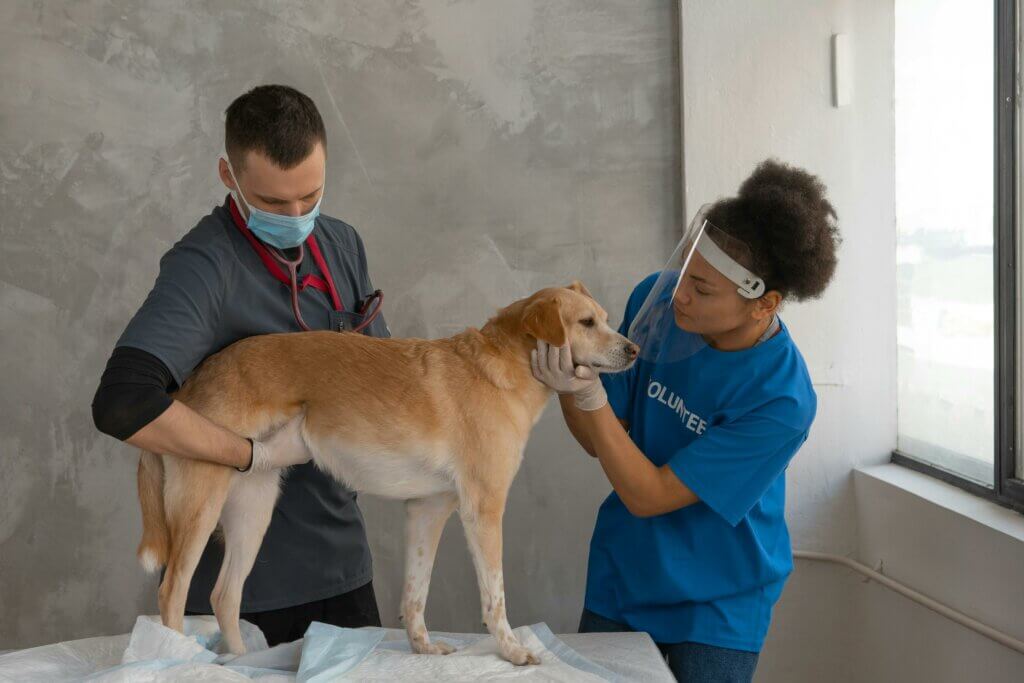Everyone knows a healthy dog’s diet should consist of protein, fat, and carbohydrates. But, other nutrients often go unnoticed, and they can significantly influence a dog’s health status. These nutrients include amino acids and specific vitamins.
Today’s article looks at why taurine is vital for dogs and what benefits it provides them with, along with the risks raised by taurine deficiency.
What is Taurine for Dogs?
Taurine is an amino acid that can be found in any dog’s body under normal conditions. When your pet’s diet is packed with vitamins, minerals, fresh veggies, and healthy sources of protein and fats, their body can produce this amino acid on its own.
Some species can’t produce taurine, meaning they must extract it from external sources – humans are a good example.
Is Taurine an Essential Nutrient for Dogs?
Although this amino acid is considered non-essential for dogs due to their ability to synthesize it from food and the normal physiological processes that happen in their bodies, a lack of taurine can negatively affect a dog’s health.
Health conditions affecting anything from the eyes to the brain and the heart can be caused by taurine deficiency, so it is generally a good idea to opt for commercial canine foods that contain moderate amounts of taurine.
Taurine Benefits for Dogs
Brain Health
Like other amino acids and important nutrients such as essential fatty acids (omega 3 and omega 6), taurine prevents certain brain conditions. To that extent, taurine allows your dog’s brain to develop properly while they are still young, so it’s particularly essential in the first 12 to 18 months of a puppy’s life.
At the same time, taurine is capable of preventing inflammation in the brain, especially in senior animals. Like people, geriatric dogs can end up suffering from cognitive dysfunction (a form of dementia), and taurine supplementation can at least partially prevent this condition.
All in all, taurine allows neurons to establish better connections among themselves (synapses), which aids in transmitting electrical impulses to the brain and other parts of the nervous system.
Heart Health
Believe it or not, this amino acid is utilized in treating dilated cardiomyopathy in dogs. It promotes better heart health by allowing the blood to flow normally, sustaining adequate blood pressure levels throughout the body and to and from internal organs.
Some dog breeds aren’t as capable of producing their own taurine just from having access to a healthy diet, such as the American Cocker Spaniel or the Golden Retriever. Some studies have found that the incidence of DCM (dilated cardiomyopathy) is higher in these breeds.
Reproductive Health
When it comes to reproduction, essential fatty acids and taurine are equally important for dogs. They prevent conditions such as impaired fetal development, and they also promote a better quality of sperm and eggs.
If you’re considering allowing your dog to mate and having a litter of puppies, supplementing their diet with taurine might be a good idea – especially if they’re one of the breeds we’ve already mentioned.
Eye Health and Function
Your dog’s retina contains a great amount of taurine, so whenever that level drops, you can expect your pet to experience all sorts of vision-related problems. Naturally, some eye degeneration is normal with age, but taurine deficiency can cause retinal cells to malfunction.
When a dog is taurine deficient, especially if they don’t benefit from a healthy diet and they’re genetically predisposed to taurine deficiency, they can develop a condition called Progressive Retinal Atrophy.
Which Dogs Are at a Higher Risk of Taurine Deficiency?
As previously mentioned, some dog breeds are more likely to develop taurine deficiency, whether from inherited health conditions or for other reasons. These are:
- Golden Retrievers
- Saint Bernards
- English Setters
- Newfoundlands
- American Cocker Spaniels
- Doberman Pinscher
- Irish Wolfhound
- Portuguese Water Dogs
Suppose you’re interested in getting a purebred puppy. In that case, you should ask the breeder for a certificate of health attesting that the dog’s parents were not diagnosed with Progressive Retinal Atrophy until the age of 24 months, after which they were used for breeding. There is an undeniable link between taurine deficiency and PRA, so it’s a good idea to focus on this health issue to screen breeders in your area.
Taurine Deficiency – Symptoms to Look Out For
While most dogs experience no taurine deficiency throughout their life, particularly if they’re properly fed and cared for, the breeds that we’ve previously mentioned will almost always develop some clinical signs associated with it:
- Poor vision
- Deafness
- Stunted growth
- Difficult breathing
- Lethargy
- Urination issues
While it doesn’t immediately cause dilated cardiomyopathy, taurine deficiency is almost always associated with certain heart-related symptoms, such as rapid breathing while the dog is resting, shortness of breath, fatigue even when engaged in very light exercise, and fainting.
How Do Vets Test for Taurine Deficiency?
You’ll be happy to know that veterinarians do have a way of testing the taurine levels in your dog’s body – a blood test is often enough to understand whether your dog has enough of this amino acid. Taurine testing is typically performed along with an echocardiogram or vision tests when either DCM or PRA is suspected.
Best Taurine Source Foods for Dogs
Because most dogs can synthesize the amino acid independently, you might find that many commercial dog diets don’t contain taurine. If you want your dog to benefit from this nutrient, you may have to do some research to find the right food, but opting for breed-specific diets might be a good idea.
For example, a diet for a Golden Retriever or a Portuguese Water Dog that’s advertised as such has a better chance of containing taurine than a typical adult dog food variety.
In terms of the best taurine-source foods that you can give your dog as a snack, they are:
- Beef
- Liver
- Pork
- Chicken and fish
- Shrimp and mussels
- Eggs
- Other organs, such as kidneys and tongues
If you are feeding your pet a homemade diet, it is paramount that you have a talk with your veterinarian or a specialized veterinary nutritionist for them to give you the list of proper ingredients, including vitamins, minerals, and amino acids to add to the recipe.
How to Manage Taurine Deficiency
The main ways in which you can ensure that your dog gets enough taurine are by giving them the right diet and some supplements. We’ve already mentioned what foods contain more taurine, so let’s take a look at how you can supplement your dog’s diet with taurine, particularly if you’re giving them a commercial diet.
Talk to your vet before buying any supplement. It’s true that most labels are pretty straightforward regarding the dosage, but after performing a blood test, your vet can recommend the right amount of taurine your dog should get daily. Supplementing from natural sources such as organs and meat is far better as your pet’s body basically takes what it needs from these foods, and the excess is eliminated.
Fortunately, this amino acid is non-toxic, so the chances of you giving your dog an overdose are extremely low. Still, you should stick to your vet’s recommendations for their internal organ health.





